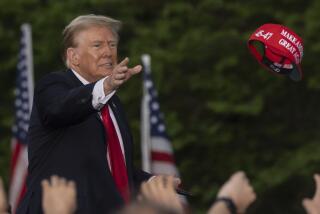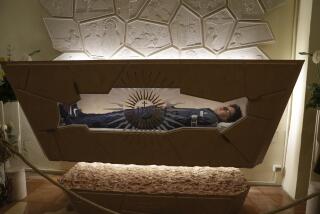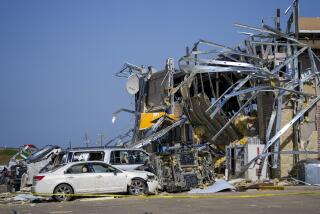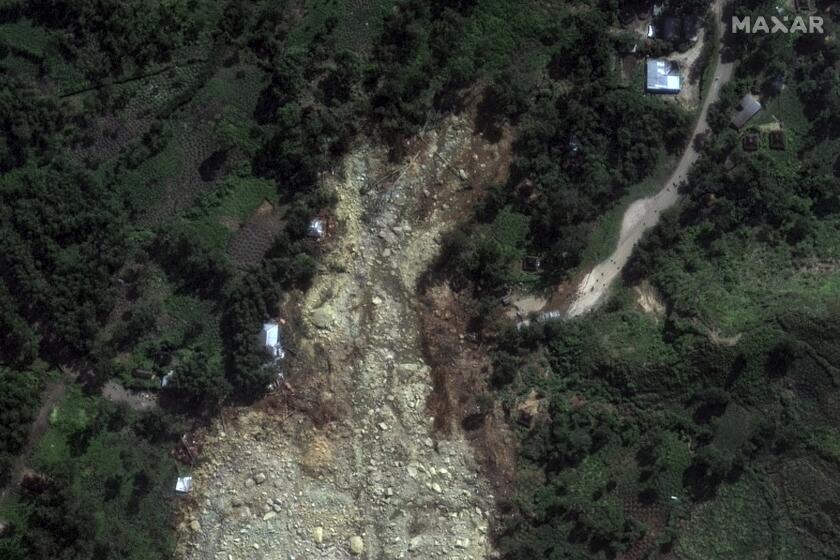Director of Czech TV Station Quits
The director of state-owned Czech Television, whose appointment last month triggered a strike by newscasters accusing him of political bias, resigned Thursday.
But protests by the striking journalists and their supporters continued, with more than 50,000 people flooding into Wenceslas Square in Prague, the Czech capital, on Thursday evening to press demands for stronger guarantees of public television’s political independence.
While that crowd cheered the news of Jiri Hodac’s resignation, the rebel employees, who have barricaded themselves in the Czech Television newsroom since shortly before Christmas, said their strike will continue until other figures appointed by Hodac resign or are dismissed.
Hodac, citing ill health as the reason for his departure, issued a statement accusing his critics of waging a “misinformation campaign that in the extent of its distorted facts has no parallel in the modern history of this country.” Hodac was hospitalized for exhaustion for several days during the dispute.
The Czech Republic’s lower house of Parliament is due to debate today a proposed law that would reduce political influence over public television by calling for nongovernmental groups to nominate candidates to radio and TV councils that control public stations. If the plan is approved, as appears likely, Parliament would give final approval to council members but not pick the candidates, as it does now.
Prima TV, a private station, predicted in its evening news broadcast that today’s parliamentary session will be stormy. The lower house may even assume direct temporary control over Czech Television and appoint an interim director.
The conflict erupted when Hodac was accused of being too close to Vaclav Klaus, speaker of the lower house and head of the conservative Civic Democratic Party. Public suspicions were widespread that Klaus--who is a former prime minister and a potential presidential candidate--hoped that public television’s criticism of politicians would be toned down in the run-up to parliamentary elections set for next year. Hodac and Klaus denied any close ties.
The controversy has drawn attention across Europe, and some Czechs have expressed concern that it could hurt the country’s bid to join the European Union. Most observers have argued, however, that the public outcry in defense of independent public television has confirmed a Czech commitment to democracy.
Polish commentators have noted that many other formerly communist countries in Eastern Europe have far more serious problems of political bias in public broadcasting than anything even alleged in the Czech Republic.
“In Poland, the man at the helm of public television is closely associated with President Aleksander Kwasniewski. He was a member of the team organizing [Kwasniewski’s] first election campaign, a man who does not hide his leftist identity,” commentator Piotr Semka wrote in a recent issue of Zycie, a conservative Polish daily. “Polish public television has many times revealed its leftist sympathies. . . . What’s interesting is people in Poland talk about it as though it was something natural, normal. The largest newspapers got used to it and comment only on too much sex or violence on the screen.”
In Prague, Vaclav Marhoul, a key protest organizer, declared Thursday evening that the controversy “is not about Mr. Hodac and never has been. It’s about principles.”
The strikers have drawn strong public backing, as seen in opinion polls and earlier rallies. Last week, an even bigger crowd of about 100,000 supporters filled Wenceslas Square in the largest protest seen in Prague since the 1989 fall of communism in the country.
*
Special correspondent Iva Drapalova in Prague contributed to this report.
More to Read
Start your day right
Sign up for Essential California for news, features and recommendations from the L.A. Times and beyond in your inbox six days a week.
You may occasionally receive promotional content from the Los Angeles Times.






